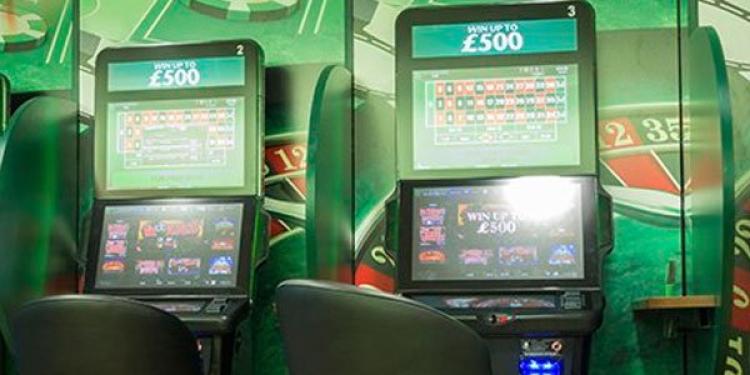Scottish Gamers Have Spent More Money than Usual on FOBTs in 2013
Posted: March 3, 2014
Updated: October 4, 2017

Recent research reveals that Scottish gamblers have wagered over GBP 4 billion last year playing on high-stakes slots.
The disturbing results of a recent gambling behavior research in Scotland raises lots of concerns with interested parties. The official figures state that over GBP 4.4 billion has been wagered in Scotland last year only on high-stakes slot machines operating in compliance with British gambling laws.
The fixed odds betting terminals, or FOBTs, is something many campaigners are fighting against, but without much results so far. Amount gambled away in Scotland has actually increased by GBP 200 million compared to 2012 figures.
Out of the staggering GBP 4 billion, GBP 156 was lost by punters, an increase of 25 million year-on-year. Naturally, the losses have altered the lives of gamers and not in a good way. This is the main concern of opponents of FOBTs.
What are these machines all about
Just why these machines are so dangerous? The FOBTs are often referred to “crack cocaine” for gamblers in Britain, because of their high rates of addiction and easy availability. The machines provide punters with possibilities to play computer versions of popular casino games including blackjack, poker, roulette, and others.
It’s just like playing at online casinos in the United Kingdom, but instead of a personal computer, these games are available in betting shops and other locations. The main problem with the machines is the fact that gamers can lose up to GBP 300 a minute, and that is why campaigners argue the FOBTs pose a grave danger.
More research findings and comments
Gambling research revealed spending increase in Scotland
• Spending on FOBTs have grown by GBP 200 million year-on-year
• Campaigners still seek to limit or ban FOBTs under British gambling laws
• Their recent attempt has failed in January this year
According to British gambling news, the research has confirmed that 180,000 Scots have gambled with GBP 822 million last year. The average spending was GBP 833 per adult, which is much higher than GBP 586 in Wales, and still higher than GBP 813 in England.
The data was compiled by the Campaign for Fairer Gambling, which have used betting industry raw figures for the research. Their spokesman, Adrian Parkinson, had the following comments: “Bookmakers now make 51 per cent of their profits from these machines and are opening or relocating shops in clusters on high streets.”
Parkinson went on to add: “The clustering of betting shops, the harm caused to gamblers and their families, the impact on Scotland’s high streets, the violence and intimidation towards betting shop staff, lone staffing, money laundering and criminality emanating from betting shops would all be dealt with through reducing the stake on fixed-odds machines.”
The spokesman has also opined: “That can be done by the Westminster Government without the need for legislation.”
FOBTs in Scotland
According to official data, there are around 4,000 such terminals operating at various Scottish bookmaker offices and land-based shops. The campaigners against the terminals note that the biggest spending is carried out in areas, where the unemployment rates are particularly high. Which puts people already in difficult situation at further risk.
When the figures were broken down by council area, the biggest amount spent on FOBTs was found to be in Glasgow. Here, 20,000 punters have gambled with a total of GBP 846 million. Edinburgh saw over GBP 454 million spent, North Lanarkshire residents gambled with GBP 359 million, and GBP 330 million was played with in South Lanarkshire.
Another opponent of FOBTs is a Labour MP from Rutherglen and Hamilton West, Tom Greatrex. He commented on the findings of the research: “I’ve met constituents who have lost their homes, their relationships have broken down and one even served time in prison as a result of their addiction to these machines.”
He went on to say: “The betting industry should be owning up to the fact these machines either cause or make much worse the problems people have with gambling.”
History of FOBTs in the country
Fixed odds betting terminals were first introduced in the United Kingdom back in 2001. In January this year, the ruling Government has succeeded in defeating the Labour motion against the machines. The motion was designed to provide local councils the necessary powers to limit the machines in a variety of ways.
In an attempt to find a somewhat compromising solution, the Association of British Bookmakers has announced plans to provide alerts to FOBTs players when they rich certain limits of playing in regards to time and money spent.
These warnings will alert gamers when they have spent 30 minutes in a row playing or have spent GBP 250 in one sitting. The Association of British Bookmakers has officially commented: “Gaming machines are popular with our customers. Just because something is popular, it doesn’t mean there is an issue with it. It just means it is popular.”
However, the Campaign for Fairer Gambling representative had nothing good to say about the Association plans, stating that it was just “a sinister attempt by the industry to mask the problem and prevent a stake reduction”.
The campaign against FOBTs is still in full force in Britain and it remains to be seen just how successful it will be. Meanwhile we advise punters to exercise responsible gambling, after all it’s about fun, not wasting away huge amounts of time and money.












